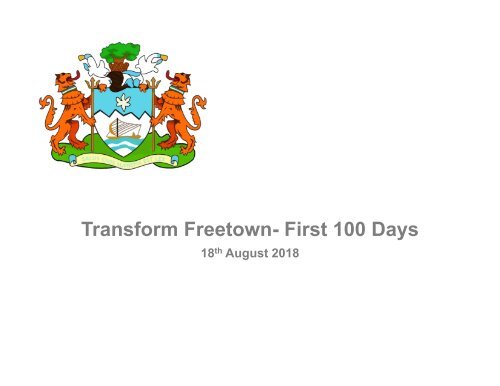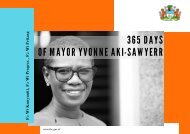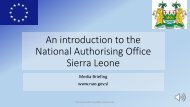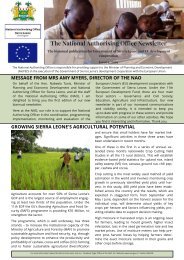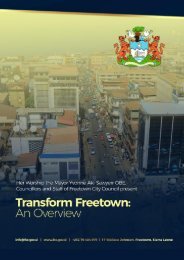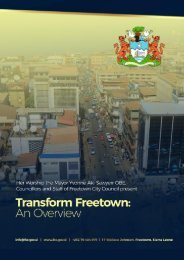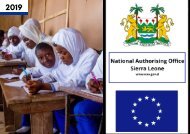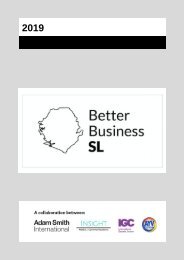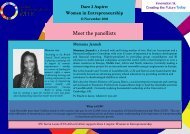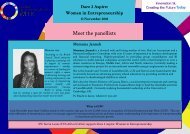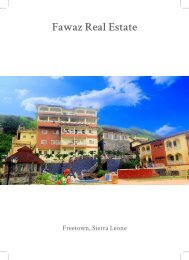Yvonne Aki-Sawyerr: The Mayor of Freetown's 1st 100 days explained.
Freetown's Mayor - Yvonne Aki-Sawyerr took the oath of office on the 11th May 2018. This presentation explains her strategy to transform Freetown, and the results achieved in her first 100 days.
Freetown's Mayor - Yvonne Aki-Sawyerr took the oath of office on the 11th May 2018. This presentation explains her strategy to transform Freetown, and the results achieved in her first 100 days.
Create successful ePaper yourself
Turn your PDF publications into a flip-book with our unique Google optimized e-Paper software.
Transform Freetown- First <strong>100</strong> Days<br />
18 th August 2018
Freetown has enormous potential as a city but faces severe challenges<br />
across all sectors and is at an increased risk <strong>of</strong> natural disasters<br />
Freetown has over 1 million residents,<br />
and with current growth rate <strong>of</strong> 4.2%<br />
p.a., it is projected to have 2 million<br />
residents by 2028<br />
<strong>The</strong> unique ecological, aesthetics<br />
and recreational resources <strong>of</strong> the<br />
natural environment <strong>of</strong> Freetown<br />
are extraordinarily high, but are<br />
threatened and are at risk <strong>of</strong> loss<br />
<strong>The</strong> expansion <strong>of</strong> the footprint<br />
or built-up area beyond<br />
Freetown’s municipal<br />
boundaries started in 2000s, and<br />
has expanded by almost by a<br />
third.<br />
About 95% <strong>of</strong> Freetown’s population not<br />
served by the water supply utility; the entire<br />
city outside the Central Business District<br />
served by septic tanks, pit and bucket<br />
latrines; urban mobility severely impaired by<br />
poor infrastructure, poor management <strong>of</strong><br />
road space, inadequate public transport and<br />
a weak institutional and regulatory<br />
framework<br />
<strong>The</strong> absence <strong>of</strong><br />
With 40 percent <strong>of</strong> Sierra<br />
Leone’s urban population,<br />
Freetown is host to the<br />
national government’s<br />
legislative, executive and<br />
judicial branches as well as<br />
foreign embassies and<br />
consulates<br />
<strong>The</strong> importance <strong>of</strong> Freetown to Sierra Leone’s economy is clear, with the city<br />
creating 30% <strong>of</strong> the country’s GDP despite housing only 15% <strong>of</strong> its population<br />
and being located on less than 0.5% <strong>of</strong> the national land mass<br />
an adequate<br />
waste<br />
management<br />
system negatively<br />
impacts residents’<br />
health and<br />
environmental<br />
sustainability
Furthermore, very limited revenues are currently at the disposal <strong>of</strong><br />
Freetown City Council<br />
50<br />
Own-Source Revenues per capita (USD)<br />
45<br />
40<br />
35<br />
30<br />
25<br />
20<br />
15<br />
10<br />
5<br />
0<br />
Lagos Nairobi Kampala Accra Freetown<br />
Lagos (2017), Nairobi (2016/17), Kampala (2016), Accra (2015 budget), Freetown (2017)
<strong>The</strong> vision to transform Freetown seeks to address these challenges<br />
through a focus on 14 sectors, grouped into 4 transformation clusters<br />
…. Working in collaboration with CENTRAL GOVERNMENT, the determination <strong>of</strong> targets<br />
and development <strong>of</strong> initiatives within sectors will be underpinned by INNOVATION and a<br />
drive towards making Freetown a SMART CITY<br />
SMART CITY<br />
INNOVATIONS<br />
Resilience<br />
Human<br />
Development<br />
Healthy<br />
Cities<br />
• Environmental Management<br />
• Urban Planning<br />
• Revenue Mobilisation<br />
• Education<br />
• Skills Development<br />
• Job Creation (Tourism focus)<br />
• Disability<br />
• Health<br />
• Water<br />
• Sanitation<br />
• Housing<br />
Women and Girls<br />
Urban<br />
Mobility<br />
• Transportation<br />
• Traffic Management<br />
• Road Maintenance
3 concurrent work streams in the first <strong>100</strong> <strong>days</strong> to address immediate imperatives,<br />
provide a situation analysis & develop the 4 Year Freetown City Transformation Plan<br />
Week 1.5<br />
Month 1<br />
13th June 2018 13th July 2018 21 st August 2018<br />
Month 2 Month 3<br />
<strong>Mayor</strong>’s start date – 13 th May 2018<br />
Council Orientation<br />
1<br />
2<br />
Initial work streams<br />
Planning<br />
immediate<br />
initiatives<br />
FCC situation<br />
review<br />
3<br />
Validating the<br />
vision<br />
Flood Mitigation, CBD Beautification and Revenue Mobilization<br />
Review <strong>of</strong>:<br />
Revenue<br />
Mobilization,<br />
Service<br />
Delivery<br />
Review <strong>of</strong>:<br />
Capital,<br />
HR,<br />
Physical<br />
Assets<br />
Consultations<br />
and Ward Level<br />
Needs<br />
Assessment<br />
Review <strong>of</strong>:<br />
Contracts,<br />
Existing<br />
Projects<br />
Sector working groups to determine sector<br />
targets, initiatives and detailed plans for<br />
development <strong>of</strong> 4 Year Freetown City<br />
Transformation Plan by end 2018<br />
Capacity support for the implementation <strong>of</strong> the initial 3 work streams and the 4 Year Freetown City Transformation Plan is<br />
provided by the <strong>Mayor</strong>’s Delivery Unit comprising UNDP, Cordaid & Hull City funded local analysts and embedded<br />
personnel from the Tony Blair Institute and McKinsey & Co
Work stream 1 Achievements – Flood Mitigation
<strong>The</strong> flood mitigation element <strong>of</strong> work stream 1 is time critical and<br />
this work began in June 2018<br />
WORK<br />
STREAM<br />
1<br />
What is the problem?<br />
q<br />
q<br />
q<br />
Flooding is a common hazard in Freetown<br />
and regularly affects several parts <strong>of</strong> the city<br />
during the rainy season<br />
Heavy rainfall, deforestation, construction <strong>of</strong><br />
dwellings in streams, inadequate garbage<br />
collection and inadequate design <strong>of</strong> the<br />
existing drainage infrastructure and poor<br />
maintenance have worsened the problem<br />
<strong>The</strong> carrying capacity <strong>of</strong> the existing storm<br />
water drainage system is constrained due to<br />
unplanned development in natural water<br />
ways and because solid waste clogs the<br />
waterways<br />
Immediate solutions for this rainy<br />
season being delivered in collaboration<br />
with SLRA, RSLAF, ONS and partners<br />
q<br />
q<br />
q<br />
q<br />
Increasing public awareness <strong>of</strong> the risks<br />
Cleaning <strong>of</strong> key waterways and drainage<br />
infrastructure and undertaking related<br />
urgent remedial works<br />
Community engagement including<br />
development <strong>of</strong> early warning<br />
mechanisms<br />
Strengthening enforcement <strong>of</strong> sanitation<br />
related bye-laws<br />
q<br />
Annual average losses from damage from<br />
floods in Freetown is as high as US$2.5m a<br />
year
In advance <strong>of</strong> cleaning <strong>of</strong> key waterways & drainage infrastructure, an<br />
assessment <strong>of</strong> the current state <strong>of</strong> flood flash points was undertaken<br />
q<br />
q<br />
q<br />
q<br />
q<br />
A team comprising Freetown City Council representatives and engineers from RSLAF<br />
and SLRA visited circa 40 flood prone sites and communities over a 2 week period<br />
commencing on 21 st May 2018<br />
<strong>The</strong> exercise enabled the team to group the flood prone sites into catchment areas<br />
beginning in the hills, flowing down through the city plains and then into the sea<br />
Observations in respect <strong>of</strong> the cause <strong>of</strong> flooding in each flood flash point were noted by<br />
the team and short-term and long-term solutions were proposed<br />
One consistent short-term solution across all the flood flash points is the clearing <strong>of</strong><br />
waste from the key waterways, culverts and drains<br />
<strong>The</strong> flood mitigation work will not be limited to clearing but will also include some limited<br />
remedial works to drains, gutters and culverts
Our flood mitigation work was delivered in two phases - Phase<br />
1 is complete and Phase 2 will be delivered by end August<br />
WORK<br />
STREAM<br />
1<br />
Flood Mitigation: Phase 1<br />
• 15-day exercise to clean waterways and<br />
bridges, and desilt blocked culverts and<br />
gutters at 35+ flash flood points<br />
• In collaboration with SLRA and RSLAF<br />
“Every year at this time, Kroo Bay<br />
will be in the news for flooding. But<br />
we want to thank the <strong>Mayor</strong> and the<br />
Freetown City for clearing our main<br />
waterway which has prevented<br />
flooding this year”<br />
Pa Alimamy Mbempah<br />
Chief <strong>of</strong> Kroo Bay<br />
Flood Mitigation: Phase 2<br />
• Target 22 additional areas identified as<br />
needing immediate intervention for flood<br />
cleaning, desilting, and opening <strong>of</strong><br />
blocked gutters, culverts and storm<br />
drainages<br />
• Continuously raise pubic awareness<br />
about proper waste management<br />
practices and the importance <strong>of</strong> keeping<br />
gutters, culverts and waterways clean<br />
from garbage and silt<br />
• Also in collaboration with SLRA &<br />
RSLAF
Flood mitigation: Phase 1<br />
Overview<br />
WORK<br />
STREAM<br />
1<br />
Overview <strong>of</strong> exercise<br />
Cash & Non-Cash Donors<br />
Conducted from 20 th June to 4 th July at 35+<br />
flash flood points including at:<br />
• Kroo Bay<br />
• Culvert<br />
• Mountain Cut<br />
• Brookfields<br />
• Rokupa Wharf<br />
• Oloshoro Murray Town<br />
• Babadorie Springs<br />
• Wilkinson Road by Mazda Garage<br />
• CRS<br />
• UNICEF<br />
• GOAL<br />
• World Food Programme<br />
• Irish Embassy<br />
• Chinese Embassy<br />
• Zenith Bank<br />
• Ecobank<br />
• Commercial Mortgage Bank<br />
• G4S<br />
• UNOPS<br />
• BRAC<br />
• Orange
Flood mitigation: Phase 1<br />
Summary Impact<br />
WORK<br />
STREAM<br />
1
Flood mitigation: Phase 1<br />
Congo Water – Wellington Old Road: Before and After<br />
WORK<br />
STREAM<br />
1
Flood mitigation: Phase 2<br />
Overview<br />
WORK<br />
STREAM<br />
1<br />
Phase 2 will target 22 additional areas that have been identified as needing<br />
immediate intervention for flood cleaning, desilting, and opening <strong>of</strong> blocked gutters,<br />
culverts and storm drainages<br />
Objectives<br />
• Revisit critical flash flood points cleaned during Phase 1 for regular desilting during<br />
the course <strong>of</strong> the rainy season<br />
• Continuously raise pubic awareness about proper waste management practices and<br />
the importance <strong>of</strong> keeping gutters, culverts and waterways clean from garbage and silt<br />
• Capture and clean 22 new flash flood points in communities, streets and waterways<br />
by desilting blocked culverts and silted gutters and water channels in flood prone<br />
communities<br />
• Increase community engagement activities, mobilizing them to participate and<br />
develop their own flood mitigation, disaster management and response plans<br />
• Conduct a post-cleaning phase to establish longer-term sustainability <strong>of</strong> the<br />
cleaning <strong>of</strong> storm water infrastructure and re-enforce public awareness in flood prone<br />
areas and waste creating communities
Work stream 1 Achievements – Revenue Mobilisation
~90% <strong>of</strong> Freetown City Council’s own-source revenues are generated<br />
from property rates, license fees, market dues and lease rent<br />
12,000<br />
Very low compliance<br />
despite over SLL 2.5bn<br />
potential revenue<br />
Freetown City Council Own-Source Revenues (2017, SLL mn)<br />
10,000<br />
1,169 10,040<br />
1,061<br />
8,000<br />
1,112 43<br />
2,410
Our revenue mobilisation quick wins are listed below; longer term<br />
plans include restructuring property tax and outsourcing asset<br />
management<br />
WORK<br />
STREAM<br />
1<br />
Collecting property rate arrears from<br />
large debtors A<br />
Conducting month-long ward-by-ward<br />
collection drives (Le 222mn raised in 12<br />
<strong>days</strong>) B<br />
Enabling payment <strong>of</strong> local tax via Africell<br />
and Orange mobile money by Sept 2018<br />
Deducting local tax at source from large<br />
private sector employers<br />
Expanding corporate parking in the CBD
A<br />
We improved our ability to identify and collect arrears from large<br />
debtors: property rate arrears amount to almost SLL 35bn<br />
Property rate arrears owed to FCC (Le mn)<br />
Largest 10 debtors<br />
Largest 20 debtors<br />
Largest 50 debtors<br />
Largest <strong>100</strong> debtors<br />
Largest 300 debtors<br />
Total arrears<br />
amounts to almost<br />
SLL 35bn<br />
- 1,000 2,000 3,000 4,000 5,000 6,000<br />
Arrears collection strategy<br />
• Digitised existing arrears<br />
database<br />
• Writing to top 300 largest<br />
commercial debtors<br />
• Will engage with Corporate<br />
Affairs Commission and<br />
Office <strong>of</strong> the Administrator<br />
General to identify highvalue<br />
commercial properties<br />
not in FCC’s database<br />
• Sent management team unit<br />
to visit non-compliant<br />
properties<br />
• After a grace period, will<br />
publish list <strong>of</strong> non-complaint<br />
properties online and in<br />
newspapers
B<br />
Conducting ward-by-ward collection drive across Freetown to collect<br />
local tax and license fees<br />
Data-driven targeting<br />
<strong>of</strong> wards<br />
• Identified highest-value<br />
wards using existing<br />
FCC and external data<br />
• Targeted highest-value<br />
wards for first collection<br />
drives<br />
Illustrative<br />
Field visits by 8 FCC<br />
teams, ward-by-ward<br />
• Deployed 8 teams <strong>of</strong><br />
FCC staff and<br />
Metropolitan Police to<br />
collect and enforce<br />
payment for local tax<br />
and license fees<br />
• Conducting drives<br />
ward-by-ward, with 1-2<br />
<strong>days</strong> to cover each one<br />
• Running a city-wide<br />
and local sensitisation<br />
campaign alongside<br />
field activities<br />
Regular monitoring <strong>of</strong><br />
revenues collected<br />
• Daily reporting <strong>of</strong><br />
payments collected and<br />
reconciled with bank<br />
records<br />
• Fortnightly performance<br />
reviews, with decisions<br />
made on whether to<br />
continue field activities<br />
• Post-implementation<br />
report to be prepared<br />
detailing revenues<br />
raised and lessons<br />
learnt for future years
Additionally calls for “Expressions <strong>of</strong> Interest” have been drafted and<br />
reviewed by NPPA for publication in week <strong>of</strong> 20 th August<br />
Calls for “Expression <strong>of</strong> Interest” to cover on-demand street parking and market<br />
construction (see highlights below) as well as operation <strong>of</strong> public toilets<br />
Street parking<br />
• Supporting the development and<br />
operation <strong>of</strong> parking systems in defined<br />
zones in the city, including:<br />
• Marking out and advertising<br />
parking bays<br />
• Building a ticketing and payment<br />
system<br />
• Enforcing compliance and<br />
payment<br />
• Reporting on parking demand<br />
• Predominantly for on-demand parking,<br />
but may also include longer-term<br />
parking solutions for corporates<br />
Market construction/refurbishment<br />
• Supporting the improvement <strong>of</strong> markets<br />
in the city through:<br />
1) Construction <strong>of</strong> new markets /<br />
refurbishment <strong>of</strong> existing markets<br />
2) Ongoing operation <strong>of</strong> these<br />
markets<br />
• Each market will need to provide<br />
adequate storage, cold stores, clean<br />
water, electricity, toilets and showers,<br />
waste management, parking, and<br />
space for under 5 childcare<br />
• A range <strong>of</strong> sites across Freetown will<br />
be selected, including Dovecot,<br />
Aberdeen, Wilberforce and Allen Town
Work stream 1 Achievements – Central Business District (“CBD)”<br />
Beautification
Relocation <strong>of</strong> traders from 17 locations within the CBD<br />
negotiated and implemented with the Traders’ Council<br />
WORK<br />
STREAM<br />
1<br />
Effective 22 nd Aug, supported by SLRSA & SLP<br />
• Relocating traders from 17 locations in the CBD to<br />
Sibthorpe Street<br />
• Partnership between Freetown City Council and<br />
Traders Council Sierra Leone, with enforcement<br />
support from the Metropolitan Police<br />
Benefits to the CBD<br />
• Beautifies the area,<br />
increasing attractiveness<br />
to tourists and investors<br />
• Improves traffic and<br />
reduces congestion<br />
CBD locations to be cleared<br />
• Siaka Stevens St (from<br />
Wilberforce St junction)<br />
• Sanders St<br />
• Lamina Sankoh St<br />
• Wellington St<br />
• Walpole St<br />
• Campbell St<br />
• Pa Demba Rd<br />
• Skye St<br />
• Goderich St (from Rokel<br />
St to lower Lumley St)<br />
• George St<br />
• Gloucester St<br />
• Charlotte St by Siaka<br />
Stevens St<br />
• St John<br />
• Big and Small Waterloo<br />
Streets<br />
• Bathurst St<br />
• Lightfoot Boston St (excl.<br />
Belgium sellers)<br />
• Circula Rd (Pademba Rd<br />
to Truscott St)
Street sweeping, bin placement and work on roll-out <strong>of</strong><br />
comprehensive waste management plan underway<br />
WORK<br />
STREAM<br />
1<br />
using 25 existing<br />
OCF youth groups<br />
§ CRS funding confirmed for plastics recycling<br />
plant at Kingtom and small waste to energy<br />
pilot. FCC supporting introduction &<br />
strengthening <strong>of</strong> other recycling businesses<br />
§ DFID funded feasibility study for new sanitary<br />
landfill almost complete; to be followed by<br />
World Bank funded investment study<br />
§ AfDB/BADEA funded project to create<br />
Materials Recovery Facility at Kissy Granville<br />
Brook and AfDB funding to improve FSM at<br />
Kingtom<br />
§ GoSL funding urgent remedial works to be<br />
carried out at Kissy Granville Brook<br />
imminently<br />
§ Actively exploring options to convert Kingtom<br />
into sanitary landfill within 20 months
Work stream 2 Achievements – Situation Analysis
Work Stream 2’s Situation Review will assist in planning for<br />
improvements in the efficiency and effectiveness <strong>of</strong> processes<br />
WORK<br />
STREAM<br />
2<br />
Increasing visibility and accountability through…<br />
Human Resource<br />
Review<br />
Asset Review<br />
Financial Review<br />
• In support <strong>of</strong> Head <strong>of</strong> HR<br />
• Pro bono services<br />
provided by Job Search,<br />
• Report to be submitted to<br />
Labour and<br />
Establishment Committee<br />
• Comprehensive review<br />
conducted by FCC<br />
Education Department <strong>of</strong><br />
all municipal schools<br />
• In support <strong>of</strong> FCC Estates<br />
Manager Pro bono<br />
property valuation services<br />
to be provided by Arthur<br />
Johnson <strong>of</strong> Sanako<br />
International Services<br />
• External review <strong>of</strong> FCC<br />
financial position<br />
• Ongoing discussions for<br />
potential pro bono partner
Work stream 3 – Developing the 4 Year Freetown City<br />
Transformation Plan
Development <strong>of</strong> the Freetown City Transformation Plan combines<br />
community needs assessment with strategic, data driven technical input<br />
WORK<br />
STREAM<br />
3<br />
August September October November December<br />
Preengagement<br />
Ward-level<br />
community<br />
needs<br />
assessments<br />
Consultation<br />
GIS data<br />
collection<br />
Aligned with Ministry <strong>of</strong><br />
Finance development<br />
plans and budgeting<br />
process<br />
Validation<br />
workshops<br />
Sector<br />
Working<br />
Groups<br />
Invitations and<br />
reading materials<br />
sent<br />
½ day intro<br />
mtgs<br />
Results <strong>of</strong> community needs<br />
assessment will be a key input<br />
into Sector Planning Labs<br />
2-day Planning Labs<br />
1-day validation<br />
workshops<br />
Plan development and approval<br />
Plan<br />
submission
Community needs assessment process has started; will be completed in<br />
mid-September and results fed into the technical Sector Working Groups<br />
Methodology<br />
• Pre-Community engagement to be conducted jointly by CRS and FCC across 48 wards<br />
• 48 wards maps to be provided by GIS teams that identify existing facilities within the communities as<br />
well as the population size (these will be used as a base line for resource mapping and gap analysis).<br />
• Community sensitisation and verification <strong>of</strong> stakeholder list to be conducted by ward teams.<br />
• 6 teams to conduct needs assessment across 48 wards (@ 6 wards a day for 8 <strong>days</strong>)<br />
• One (1) Technical staff will be allocated to each group to support ward teams in the needs assessment<br />
facilitation session<br />
Needs/<br />
Service<br />
Quality check<br />
• Baseline maps to be used to identify and verify existing facilities within the wards eg (schools, hospitals,<br />
markets, community centers, public toilets, available community lands etc.).<br />
• Service delivery rating <strong>of</strong> existing facilities within the communities to be conduct to identify functional and nonfunctional<br />
facilities (This to be done in percentage(%)<br />
• Community to be guided to identify their felt and unfelt needs/Challenges .<br />
Data<br />
collection<br />
• Primary data from Community needs assessment will be collected by Facilitators.<br />
• Data will be inputted by Analysts using CRS electronics data tools<br />
• Data will then be aggregated and consolidated by ward by the data Analyst and GIS team<br />
• Data will be validated and presented to the <strong>Mayor</strong>
<strong>The</strong> Freetown City Transformation Plan will be developed with multistakeholder<br />
Sector Working Groups providing technical support to FCC<br />
WORK<br />
STREAM<br />
3<br />
Legal framework<br />
Council Committee<br />
Sector Working Group<br />
• s.15 Local Govt Act<br />
requires council to meet<br />
at least once per month<br />
& by s.18 must be<br />
minuted<br />
• s.19 provides for the<br />
appointment <strong>of</strong> council<br />
committees<br />
• s.19(5) provides that a<br />
council committee may<br />
co-opt any person to<br />
advise it on any matter<br />
(no vote)<br />
Key:<br />
• Members <strong>of</strong> both groups<br />
• Members only <strong>of</strong> council<br />
committee<br />
• Members only <strong>of</strong> Working Group<br />
• Chair <strong>of</strong> Committee<br />
• Deputy Chair <strong>of</strong> Committee<br />
• Relevant FCC Lead (Officer;<br />
Dept Head, etc)<br />
• Councillors<br />
• Technical Co-chairs <strong>of</strong> Sector<br />
Working Group [non-voting]<br />
• 3 co-opted members <strong>of</strong><br />
Sector Working Group [nonvoting]<br />
• Co-Chair – Council Committee<br />
Chair<br />
• Technical Co-Chair – MDA<br />
• Technical Co-Chair – Develop’t<br />
or Implementing Partner<br />
• Members:<br />
• Other MDAs,<br />
• Development &<br />
Implementing Partners<br />
• Private Sector, Academic<br />
Institutions<br />
• CBOs, Civil Society<br />
• Deputy Chair Council Committee<br />
• Relevant FCC Lead<br />
7 individuals will be common to both groups
Suggested MDA technical co-chairs listed below; participation <strong>of</strong><br />
other MDAs & sector stakeholders in working groups will be critical<br />
WORK<br />
STREAM<br />
3<br />
4 Transformation<br />
Clusters<br />
14 Sectors/Areas <strong>of</strong> Focus<br />
11 Sector Working Groups<br />
Suggested MDA<br />
Technical Co-Chairs<br />
Resilience<br />
• Environmental Management<br />
• Urban Planning<br />
• Revenue Mobilisation<br />
• Environmental Management<br />
• Urban Planning & Housing<br />
• Revenue Mobilisation<br />
EPA<br />
MLHE<br />
LGFD<br />
Human<br />
Development<br />
Women and Girls<br />
• Education<br />
• Skills Development<br />
• Job Creation (Tourism focus)<br />
• Disability<br />
• Education<br />
• Skills Development<br />
• Job Creation (Tourism focus)<br />
• Disability<br />
MBSSE<br />
MTHE<br />
MTI<br />
MSWCGA<br />
Healthy<br />
Cities<br />
• Health<br />
• Water<br />
• Sanitation<br />
• Housing<br />
• Health<br />
• Water<br />
• Sanitation<br />
DHMT<br />
MOWR<br />
MOHS<br />
Urban<br />
Mobility<br />
• Transportation<br />
• Traffic Management<br />
• Road Maintenance<br />
• Urban Mobility<br />
MTA
Sector working groups will develop concrete targets and priority<br />
initiatives, which will be regularly and transparently reported<br />
WORK<br />
STREAM<br />
3<br />
Each sector will have concrete targets, priority<br />
initiatives and milestones…<br />
… which will be reported on regularly for<br />
accountability and early issue identification<br />
Sector targets<br />
Priority<br />
Initiatives<br />
Subinitiatives<br />
Concrete sector targets<br />
KPIs and Delivery Indicators will be<br />
used to track initiatives to measure<br />
results<br />
Milestones and activity planning<br />
for each sub-initiative<br />
Dashboards showing progress against plans and targets…<br />
… and publicly tracked on FCC website and social media<br />
Milestones<br />
Activities<br />
Each activity plan to include details:<br />
• Start/end date<br />
• Responsible organisation<br />
• Responsible person<br />
• Ward (where applicable)<br />
Detailed activity plans in 3 month cycles<br />
1 Milestones which start on time, out <strong>of</strong> all <strong>of</strong> those which are scheduled to have started. As <strong>of</strong> the current week<br />
2 Milestones which end on time, out <strong>of</strong> all <strong>of</strong> those which are scheduled to have ended. As, <strong>of</strong> the current week
Activity level tracking will be against planned activity dates,<br />
milestones and planned completion date <strong>of</strong> initiatives<br />
WORK<br />
STREAM<br />
3<br />
Detailed Activity Plan &<br />
Timeline shows:<br />
v<br />
v<br />
v<br />
v<br />
v<br />
v<br />
v<br />
Initiative and Sub-<br />
Initiatives<br />
Initiative Leads<br />
Activity owner<br />
Planned dates for<br />
activities with timeline<br />
Updated fortnightly for<br />
actual progress<br />
Clear ID <strong>of</strong> whether<br />
activity completed<br />
Spreadsheet<br />
automatically updates<br />
subsequent activities if<br />
dates re-planned<br />
• Activity level planning and tracking will be in 3-monthly cycles<br />
• Working Groups will use activity tracker for progress and performance management
Sector Working Group schedules are timed to enable completion<br />
<strong>of</strong> the Freetown City Transformation Plan by December 2018<br />
WORK<br />
STREAM<br />
3<br />
August<br />
September October November December<br />
Invitations sent to<br />
potential members <strong>of</strong><br />
sector working group.<br />
Resources &<br />
research materials<br />
sent<br />
Responsible parties:<br />
FCC & Facilitators<br />
Working Group – <strong>100</strong>%<br />
attendance required<br />
Co-Chairs & Facilitators<br />
Review & approval by<br />
relevant FCC committee<br />
½ day<br />
introductory<br />
meetings held<br />
2 day Planning Labs for<br />
each sector working group to<br />
produce outline plan<br />
Co-chairs & facilitators<br />
document outline 4-yr plan<br />
leading to…<br />
1 day validation workshop<br />
Outline plan submitted to FCC<br />
committee for review & approval<br />
Outline Plan<br />
identifies:<br />
• Targets/KPIs<br />
• Initiatives &<br />
sub-initiatives<br />
• Initiative leads Detailed plan<br />
Following approval <strong>of</strong> outline plan, detailed<br />
activity planning, budgeting and resource<br />
mobilisation by initiative leads, leading to…<br />
Submission <strong>of</strong> Detailed plan to FCC committee<br />
All Sector Working Groups will have submitted 4 Year Freetown City Transform plan inputs by<br />
early December 2018, aligned with required FCC submissions to Ministry <strong>of</strong> Finance<br />
Aligned with Ministry <strong>of</strong><br />
Finance development<br />
plans and budgeting<br />
process<br />
identifies:<br />
• Targets/KPIs<br />
• Initiatives & subinitiatives<br />
• Indicative budget<br />
for 4 yrs<br />
• Milestones for<br />
min. 1 yr<br />
• Activities for 3<br />
mths
Ongoing coordination and reporting will be required to optimise<br />
synergies and facilitate problem solving<br />
WORK<br />
STREAM<br />
3<br />
Purpose<br />
Activity level<br />
implementation and<br />
tracking<br />
Performance<br />
management, problem<br />
solving and issue<br />
escalation<br />
Overall<br />
performance<br />
management &<br />
vision<br />
Who<br />
Initiative Working<br />
Group, led by Sub-<br />
Initiative Leads<br />
Sector Working Group<br />
Meeting, chaired by<br />
<strong>Mayor</strong><br />
Transform Freetown<br />
Forum: <strong>Mayor</strong> and Co-<br />
Chairs<br />
Task<br />
Formal reporting against<br />
detailed 3-monthly<br />
activity plan<br />
Review current status,<br />
unblock/escalate<br />
problems, revise future<br />
plans/timeline as required<br />
Sector reporting, lesson<br />
sharing, vision sharing<br />
Frequency<br />
Fortnightly<br />
Quarterly and ad hoc<br />
(especially for initiative<br />
groups) as needed<br />
Twice per year (first<br />
forum in December 2018)
As part <strong>of</strong> our commitment to transparent & open data, plans are underway<br />
to enable the FCC website to provide the information detailed below<br />
Delivery dashboard<br />
Ø Deep dive on various priority<br />
initiatives (will rotate over time)<br />
Ø Targets by sector, with committee<br />
details<br />
v Drill-down into milestones, with<br />
tracked progress<br />
Ø Map with ward-specific options to see<br />
specific projects under each four<br />
clusters<br />
6<br />
4<br />
2<br />
0<br />
Resource Utilisation<br />
Revenue collected<br />
Property<br />
Tax<br />
Market<br />
Dues<br />
Business<br />
Tax<br />
Waste Management<br />
Market construction<br />
CBD Beautification<br />
Etc.<br />
Etc.<br />
Q2 2018 Q3 2018 Q4 2018<br />
Budget<br />
Actual Spend<br />
Updated<br />
quarterly<br />
Principles for the website:<br />
Designed to be mobile-based Simple icons Intuitive information Opportunity to recognise FCC<br />
achievement
For more information about #TransformFreetown,<br />
please visit:<br />
Facebook – Freetown City Council<br />
Website – www.fcc.gov.sl


